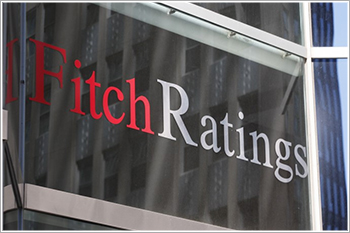
Fitch Ratings has affirmed Power Grid Corporation of India Ltd's (POWERGRID) Long-Term Foreign- and Local-Currency Issuer Default Ratings (IDRs) at 'BBB-'. The Outlook is Negative. The agency has also affirmed POWERGRID's senior unsecured rating at 'BBB-'.
The ratings are constrained by credit profile of the India sovereign (BBB-/Negative), which owns 51.34% of the company, under Fitch's Government Related Entities Rating Criteria. POWERGRID's 'bbb+' Standalone Credit Profile (SCP) benefits from the regulatory nature of more than 90% of its revenue, supported by a stable regulatory regime (current five-year regulatory tariff period ends in March 2024) that provides certainty of cash flows, along with POWERGRID's dominant market position in the Indian power transmission sector and strong financial profile.
KEY RATING DRIVERS
Strong State Linkage: We regard the status, ownership and control of POWERGRID by the Indian government as 'Strong' considering its strategic importance in the Indian power transmission sector. The state also owns a majority stake and appoints its board. However, the company operates as a commercial entity. We assess the support record as 'Strong'. Support has been infrequent due to POWERGRID's strong financial position, but we expect support to be forthcoming if needed.
Strong Support Incentive: Fitch assesses the socio-political implications of a POWERGRID default as 'Moderate', as we believe a default is unlikely to severely disrupt transmission services as long as the infrastructure is maintained. We assess the financial implications of a default as 'Strong', as POWERGRID is a key state-owned borrower. A default could significantly limit the availability of financing for other government-related entities (GREs).
Increased Receivables; Weak Counterparties: POWERGRID's receivable days (adjusted for bills discounted) increased to 70 days by end-December 2021 (45 days excluding adjustment) compared with 60 days at end-March 2021 (34 days excluding adjustment). For the bills discounted, the interest portion and other financing charges are borne by the utilities, but creditors still have recourse to POWERGRID should the utilities fail to make payments. Fitch consequently treats the bill discounted amount as POWERGRID's debt. So far there has been no default in the repayment by the state utilities against bill discounting.
We expect POWERGRID's trade receivable days (including bills discounted) to remain close to 65 days in the financial year ending March 2022 (FY22) and at 62 days starting FY23. POWERGRID's receivables benefit from limited direct single-counterparty risks as transmission charges from state utilities are collected by a pooling mechanism and transferred to individual transmission utilities. It also benefits from letters of credit for 105% of its average monthly revenue and tripartite agreements between central government, central bank and state governments.
InvIT IPO Credit Neutral: Fitch assesses the IPO of POWERGRID's infrastructure investment trust (InvIT) in May 2021 to be credit neutral. The InvIT facilitates asset monetisation and equity release for future investments, but its size at this point is too small to have a significant impact on POWERGRID's financial metrics. Management intends to further monetise its assets worth INR375 billion by FY25 in line with their National Monetisation Pipeline framework..
Predictable Revenue: POWERGRID's rating benefits from the predictable nature of more than 90% of its revenue, which has no offtake risk as long as it meets the operational benchmarks. POWERGRID has maintained availability over the years at well above regulatory benchmarks of 98% for alternating-current and 95% for high-voltage direct-current systems (9MFY22: 99.82%). Revenue from its operational transmission assets is based on a return on equity of 15.5% and full pass-through of all fixed costs that are within regulatory norms, including interest charges.
Moderate Capex Intensity, Deleveraging to Continue: We expect POWERGRID's net leverage to fall and remain below 3.5x from FY22 (FY21: 4.1x) due to lower capex intensity and higher cash flows as new projects are commissioned. POWERGRID's capex intensity has been low since FY20, driven by fall in number of transmission projects awarded in India. With increasing competition from the private sector, we expect POWERGRID's capex intensity to remain between 25%-35% (FY21: 26%; FY20: 35%), which is lower than in FY19 (68%) and FY18 (87%).
Fitch expects the award of transmission projects to gather pace, which explains our capex estimates, which are 50%-60% above the management case that includes only the projects on hand. Despite the increasing competition from the private sector, Fitch expects POWERGRID to maintain a market share of around 40% in new tariff-based competitive bidding (TBCB) projects.
Dominant Market Position: POWERGRID's ratings benefit from its strong market position. The company owns and operates around 85% of India's inter-regional and inter-state electricity-transmission network assets. POWERGRID has a competitive edge in building and maintaining transmission networks efficiently due to its wide network of substations across India and strong execution record. The group commissioned INR185 billion of projects in 9MFY22 and INR215 billion in FY21, exceeding Fitch's expectations despite the intermittent impact of the Covid-19 pandemic in the past two years.
Tariff-Based Projects Insignificant: We expect POWERGRID's TBCB projects, whose returns are less protected and marginally lower than those under the cost-plus tariff model, to account for no more than 10% of revenue in the medium term. In any case, overall profitability is likely to remain stable in light of the minimal operating costs for the transmission business. The company currently has 19 TBCB projects with 10 already operational and contributing about 3% to the revenues.
DERIVATION SUMMARY
POWERGRID's rating is capped by Indian sovereign rating under Fitch's Government-Related Entities Rating Criteria. We assess the company's status, ownership and control as well as its support record as 'Strong', similar to the assessments for GAIL (India) Limited (BBB-/Negative) and NTPC Limited (BBB-/Negative), in line with the criteria. We assess the financial implications of default as 'Strong' and socio-political implications of default as 'Moderate' for all three entities.
Linkages of some of the regional peers, like Indonesia's PT Perusahaan Listrik Negara (Persero) (PLN, BBB/Stable), State Grid Corporation of China (SGCC, A+/Stable) and Vietnam Electricity (BB/Positive), with their respective sovereigns are assessed as stronger than that for POWERGRID. This is driven by 100% sovereign ownership, a higher degree of control by the state and a consistent record of state support. In addition, we assess their defaults would have larger socio-political impact and more severe financial implications for the state and other GREs compared with POWERGRID.
KEY ASSUMPTIONS
Fitch's Key Assumptions Within Our Rating Case for the Issuer:
- Return on equity of 15.5% for the Regulated tariff mechanism transmission projects and 11% for projects under the TBCB mechanism.
- All in costs, including depreciation and interest expenses, are passed through within the regulatory norms for projects under the cost-plus tariff model
- Capex to remain almost flat at INR100 billion in FY22 (FY21: INR102 billion) and increase to INR150 billion in FY23 and INR180 billion after that
- Project value commissioned at INR200 billion in FY22 and INR150 million per year after that
- Dividend pay-out ratio to increase to 68% in FY22 to incorporate special dividend following the invIT IPO (FY21: 62%). Dividend payout at 62% in FY23 and thereafter.
RATING SENSITIVITIES
Developments That May, Individually or Collectively, Lead to Positive Rating Action
- The Outlook is Negative and we therefore do not expect positive rating action. The Outlook will be revised to Stable if the sovereign's Outlook is revised to Stable.
Developments That May, Individually or Collectively, Lead to Negative Rating Action:
- A downgrade of India's sovereign ratings
For the sovereign rating of India, the following sensitivities were outlined by Fitch in its Rating Action Commentary of 21 November 2021:
Factors that could, individually or collectively, lead to negative rating action/downgrade:
- Public Finances: Failure to put the general government debt/GDP ratio on a downward trajectory, for instance, from insufficient fiscal consolidation.
- Macro: A structurally weaker real GDP growth outlook, for instance, due to continued financial-sector weakness or reform implementation that is lacking, further weighing on the debt trajectory.
Factors that could, individually or collectively, lead to positive rating action/upgrade:
- Public Finances: Implementation of a credible medium-term fiscal strategy to bring post-pandemic general government debt down toward 'BBB' category peers' levels.
- Macro: Higher medium-term investment and growth rates without the creation of macroeconomic imbalances, such as from successful structural reform implementation and a healthier financial sector.
Related Tags

![]() IIFL Customer Care Number
IIFL Customer Care Number
(Gold/NCD/NBFC/Insurance/NPS)
1860-267-3000 / 7039-050-000
![]() IIFL Securities Support WhatsApp Number
IIFL Securities Support WhatsApp Number
+91 9892691696
www.indiainfoline.com is part of the IIFL Group, a leading financial services player and a diversified NBFC. The site provides comprehensive and real time information on Indian corporates, sectors, financial markets and economy. On the site we feature industry and political leaders, entrepreneurs, and trend setters. The research, personal finance and market tutorial sections are widely followed by students, academia, corporates and investors among others.
Stock Broker SEBI Regn. No: INZ000164132, PMS SEBI Regn. No: INP000002213,IA SEBI Regn. No: INA000000623, SEBI RA Regn. No: INH000000248

This Certificate Demonstrates That IIFL As An Organization Has Defined And Put In Place Best-Practice Information Security Processes.